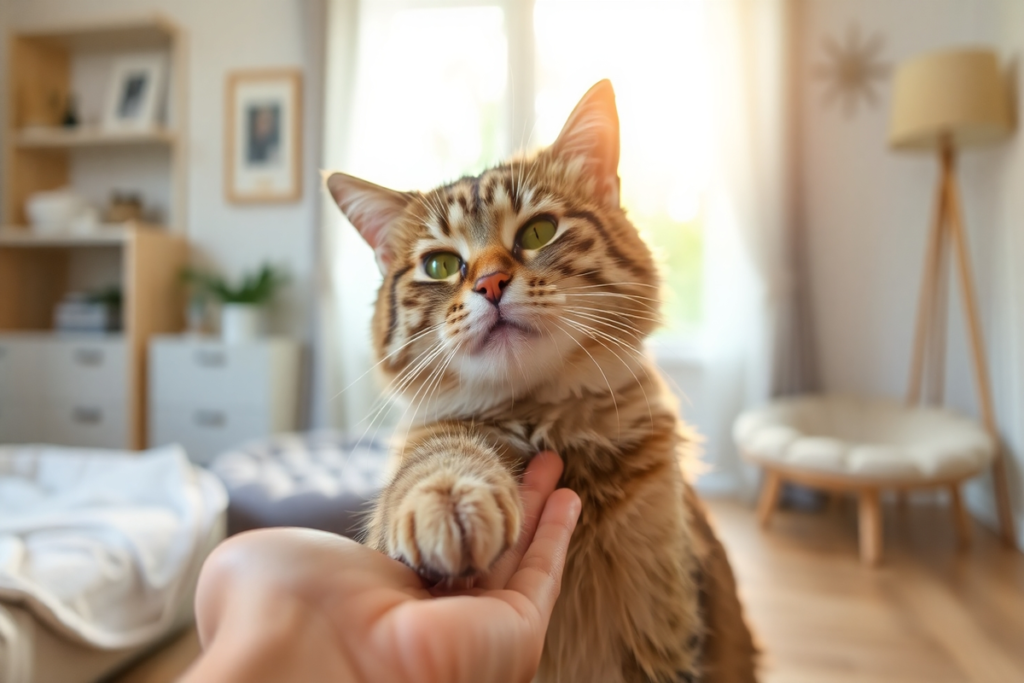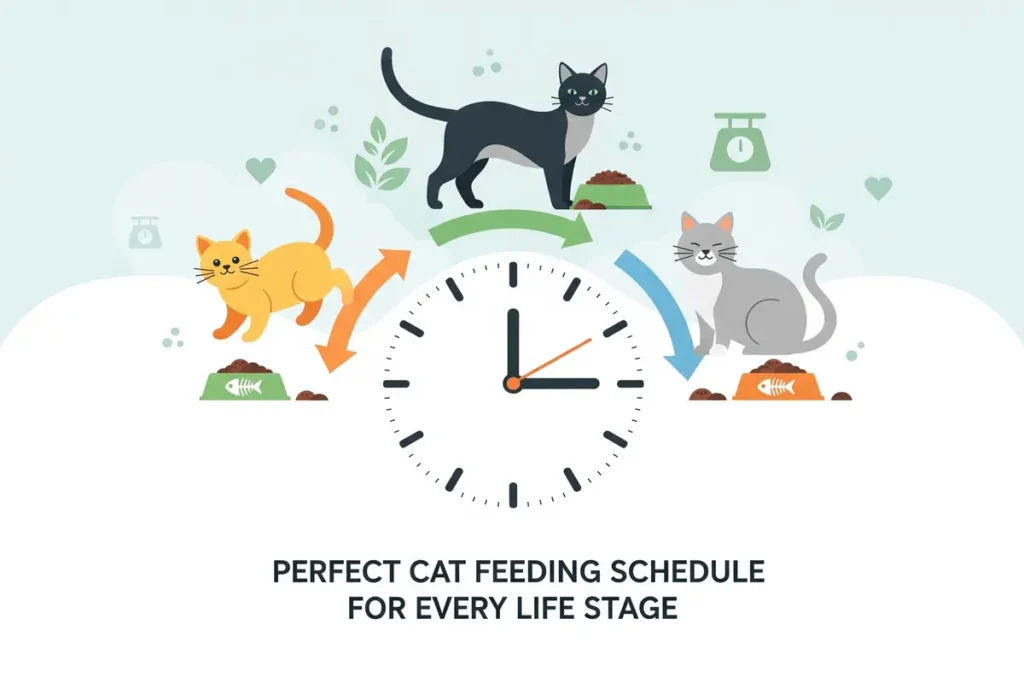If you’ve ever wondered, “Why is my cat meowing so much?” you are not the only one. I’ve been a lifelong cat lover myself and spent years studying cats and their behavior.
As a pet owner, I’ve puzzled, and sometimes gotten pretty frustrated, by what seems like never-ending chit-chat.
Let’s see what all that excessive meowing actually means, why your cat is talking your ear off, and what you can do to improve things for both of you.
What Does Excessive Meowing Mean?
First of all, it’s important to understand that a meowing is your cat’s way of communicating with you.
Dogs bark at all sorts of things, cats don’t meow at other cats. When they meow, they’re communicating with us, using that vocalization as a way to nicely inform us about what they need or how they’re feeling.
If your cat is meowing excessively, it most likely indicates your cat is trying to get your attention for a purpose.
Cats meow for various behavioral signals ranging from hunger, stress, and boredom to discomfort. We will discuss all of them to make you feel responsible pet owners who really get worried and start thinking why my kitty is showing this behaviour.
Common Reasons for Excessive Meowing
When you start feeling that my cat is meowing excessively more than normal and causing emotional distress for you.
It may be the right time to figure out what actually your cat is trying to communicate with you by excessive yelling and meowing.
Let’s examine the top reasons for excessive meowing so you can start interpreting what your cat might be communicating.
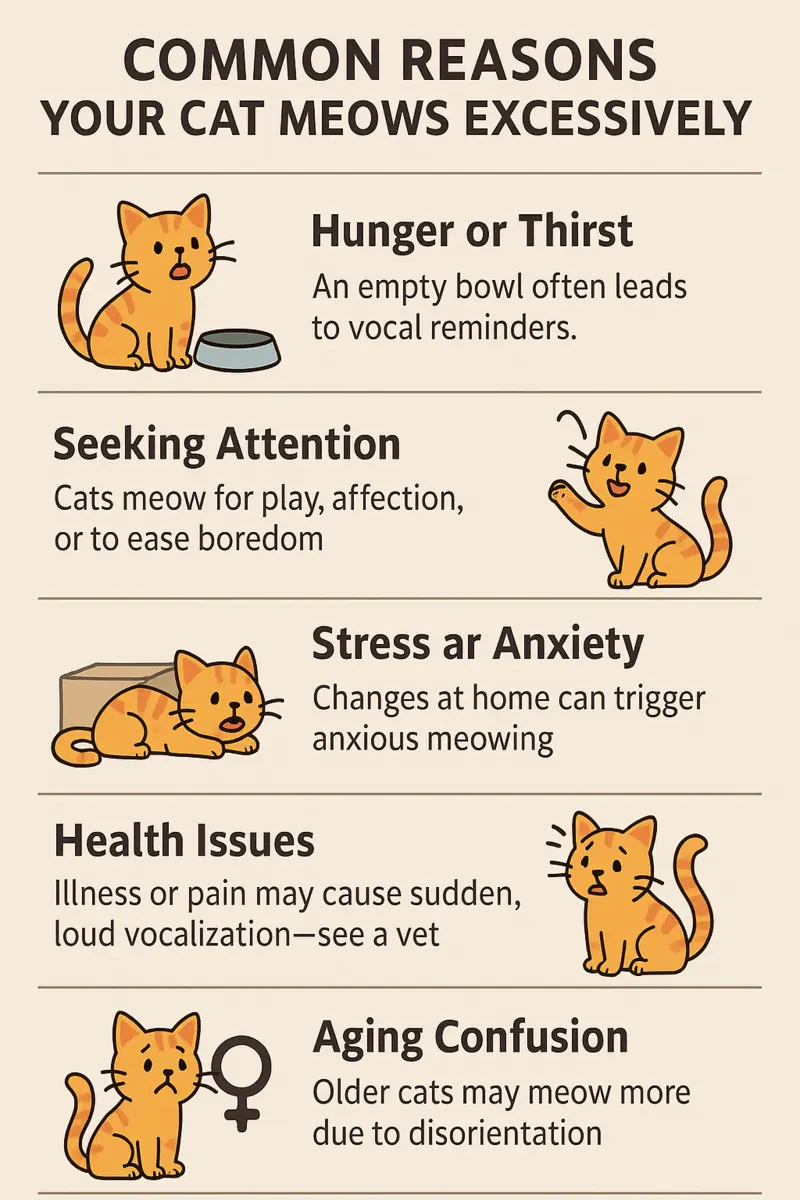
Hunger or Thirst
Is your cat’s meow a hungry little bell? Cats are quick to learn when they make noise, they get food, so when they’re hungry or thirsty, they will let you know. Try to maintain a consistent feeding schedule with food, and ensure you have fresh water always available.
Seeking Attention or Affection
Cats are social animals and at times they meow because they want to play, to be petted, or just to spend time with you. When you hear your cat meowing near you or following you around often, most of the time they are just saying, “Hey, I want some company!”
Stress, Anxiety, or Environmental Changes
Have you moved recently, added a new pet, or changed your cat’s routine? Cats can react to change in various ways and tend to vocalize more when stressed. If the anxious meowing seems nonstop, the stress could be the culprit.
Health Issues or Pain
One key thing I always emphasize to cat owners is this. Sudden or excessive extremes in meowiness can indicate your cat is not well. Illness, injury, or pain can be distressful to a cat, so, when the meowing seems excessive, and is combined with other even minor symptoms like hiding or loss of appetite, an appointment with the vet can be warranted.
Mating Behavior in Unspayed/Unneutered Cats
If your cat isn’t altered (spayed or neutered), then when the cat is in heat, or looking for a mate, meows can become excessive. These calls will typically be loud, persistent, and hard to ignore.
When Should You Be Concerned?
So then, you might be asking yourself, “Alright, my cat’s meowing is excessive – but when should I really start to be worried?
This is a great question to ask yourself! I have seen a lot of cats and have spoken to a lot of concerned pet owners. I can say that meowing is typical, but there are times when it sends a clear signal that something is wrong.
Sudden and Intense Meowing
If you notice your cat is suddenly meowing differently (louder, more urgent, distressed, etc.), then that is the time to pay close attention to your cat’s behavior. Especially if you notice other warning signs along with your cat meowing more than normal. such as your cat is continuously tired, vomiting, or it is not eating like normal. Because those symptoms are typically saying something is wrong with your cat! This is very similar to humans.
Meowing with Signs of Distress
Another thing I keep an eye out for is if the meowing is associated with any signs of distress. For example, is your cat now panting like a dog? Is your cat pacing back and forth? Is your cat hiding in strange places? Perhaps your cat is suddenly more aggressive or hyper? These behaviors indicate that they may appear anxious, fearful, or uncomfortable, that the meowing is simply their way of communicating that there is something wrong.
Nighttime Vocalizations That Disrupt Sleep
Nighttime meowing can be tricky too. Most cats have their own schedule, and many are most active at dawn or dusk. A normally quiet cat may start yowling or howling at night and disturbing your sleep. While this can be annoying, at times, it can indicate a bigger problem. Sometimes older cats can develop cognitive problems, such as confusion or memory loss, combined with an urge to vocalize when it is dark and quiet.
When to Consult Your Veterinarian
So, my advice to you is: if you notice these behavioral indicators (e.g. sudden onset meowing, distressful behavior, and nighttime disturbances) that are out of the ordinary for your cat, don’t ignore it. It is always better to be safe than sorry, and have the vet rule it out. All you are doing is being a responsible cat parent, and I’m sure your kitty will be happy you did it.
Medical Concerns That Could Cause Excessive Meowing
Sometimes, when a cat won’t stop meowing, there is a deeper issue going on for a reason that is more than boredom or demand for attention. As a professional in the area of feline behavior, I can tell you; a medical issue is a leading cause of endless meows.
Let me take you through the most common health-related causes I have experienced.
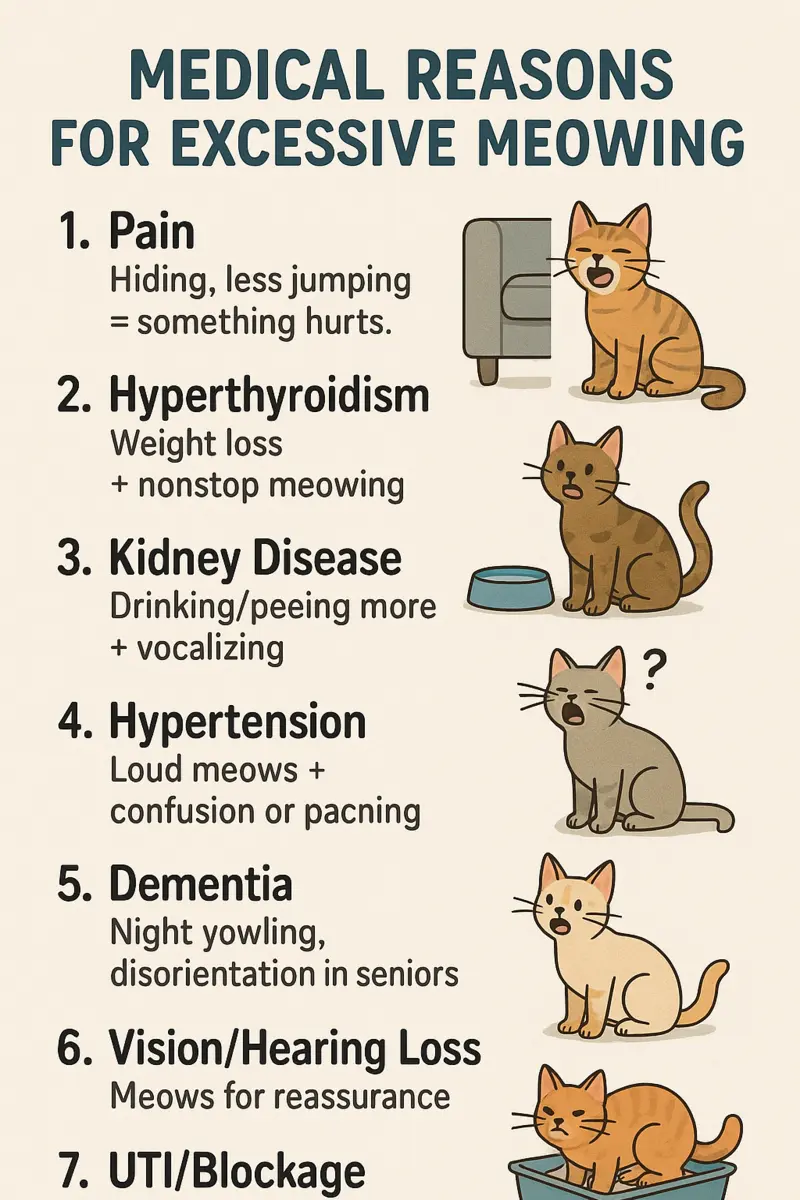
Pain or Discomfort
I have found that cats are very good at hiding pain, but they do usually give us signals if we are paying attention. If your cat suddenly starts vocalizing more and is hiding more, has a decreased activity level, or is not jumping on their favorite shelf or high spot, it’s possible that pain or discomfort may be the culprit. Conditions such as arthritis, dental issues, or infections often cause this type of distress.
Hyperthyroidism (Overactive Thyroid)
Hyperthyroidism is one of the more common conditions in older cats. It increases their metabolism, resulting in significant weight loss, even if they are still eating crazily (and yes, they will often meow, usually all night) . If you notice that your cat is fussier, and seems more vocal than usual, and just can not settle, this is certainly worth a test.
Kidney Disease or Kidney Failure
A cat with increased drinking/urination and vocalizing (more meowing) might have kidney issues. Cats that have chronic kidney disease often look disoriented or uncomfortable and thus their vocalizations might indicate that inner stress. This is usually noted in older cats and should ideally be addressed by the vet sooner than later.
Hypertension (High Blood Pressure)
Yes, cats can have hypertension or high blood pressure, and it usually comes with kidney issues or hyperthyroidism. Look out for his unexpected intense vocalizations with other signs, like confusion or pacing. Cats can become hypertensive without the owner knowing, so do not identify normal behavioral changes as anything but call your vet if you notice these signs.
Cognitive Dysfunction (Feline Dementia)
Older cats can sometimes be more vocal simply due to age-related cognitive issues that cause confusion and anxiety. If your senior cat is suddenly vocal during odd hours and seems confused as they walk around aimlessly while meowing, they could have feline dementia. It’s sad and frightening, but there are ways to help them with their routines and be more comfortable.
Sensory Loss (Vision or Hearing Loss)
Meowing may be your cat’s way of compensating or expressing disorientation after losing part of their vision or hearing. I have experienced cats become more vocal when they lose hearing themselves, even if they’re looking for confidence in a world that feels like they don’t know. Ultimately, your cat’s behavior will be your best guide, in conjunction with other signals as well.
Urinary Tract Issues
It’s one of the serious and sometimes urgent issues.. If your cat is meowing while trying to urinate, or starts avoiding the litter box, this could indicate a UTI or blockage. I always recommend seeking a veterinarian immediately, especially if your male cat is straining or has not urinated, which can be deadly.
If any of these situations sound all too familiar to you, don’t wait. A simple vet visit can provide you with comfort, and frequently, reassurance for both you and your cat. In situations of sudden meowing change, it’s better to err on the side of caution.
How to Reduce Excessive Meowing
At this stage, if you are dealing with a cat that just won’t stop meowing, there is no need to panic – there is definitely hope. Over the years, I have worked with many cat parents facing this exact set of circumstances, and I wanted to share some practical advice that will really help calm your kitty’s chatter.
Keep in mind that a complete routine is better to reduce stress and shouting. If you’re new to feline care, these cat care tips for beginners will help you establish a happier home for your kitty.
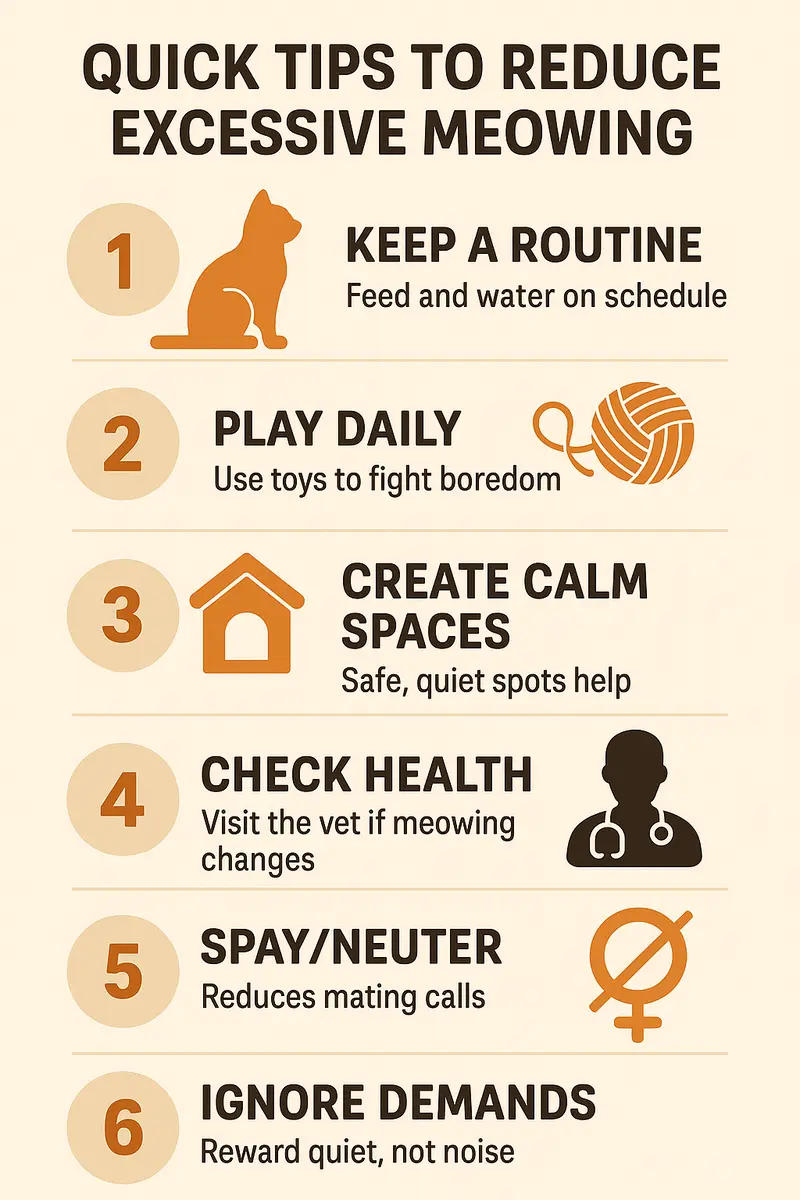
Maintain a Regular Feeding and Hydration Schedule
First of all, cats love routine. One of the best things I recommend to decrease meowing is to follow consistent feeding times. If your cat knows when to expect their meals, they won’t be as likely to remind you of it with a symphony of meows. Also, never underestimate clean freshwater. Keeping their bowl full and clean can eliminate possible thirst-induced fussy behavior that could come out as meowing.
Increase Playtime and Mental Stimulation
Now, let’s discuss boredom. A bored cat is a noisy cat. Introduce lots of interactive toys (like feather wands and laser pointers) to get your cat up and moving. Puzzle feeders are another great one, too; they make your cat work a little bit for their food, which can keep their minds busy and make them less likely to meow just because they are bored. Plus, it provides times during your day that are fun in addition to times that are literally necessary for your cat to remain happy and quiet.
Provide a Safe, Comfortable Environment
I can’t emphasize enough the importance of creating a peaceful and cozy area for your cat. Cats love to have quiet corners for them to retreat to, blooming with opportunities. Here’s an awesome thing about cats: when they feel safe, they usually meow less – they feel secure which means, they are not stressed and they’re not acting anxious. Make sure they have soft beds, hiding areas, and a tranquil place to relax.
Rule Out Medical Problems with Vet Checkups
Certainly, if you notice that your cat’s meowing is suddenly elevated or the tone of their meow is changing, always remember having your vet check your cat is a smart decision. In fact, from my own experience, a health problem is usually the unknown cause of excessive meowing. In almost all situations, the vet can rule out things like pain, infections, and other conditions where the cat would be uncomfortable and vocal about it.
Consider Spaying or Neutering
Another significant tip is considering spaying or neutering your cat if it hasn’t been done already. This simple procedure can drastically reduce meowing related to mating, which is often loud and relentless. Moreover, it greatly benefits your cat’s health in the long run.
Set Boundaries on Attention-Driven Meowing
Finally, if your cat has figured out that they get what they want attention, treats, playtime by meowing, it’s time to create some boundaries. I suggest that you show affection on your own terms and not just when your cat is asking. I know, it’s hard to initially ignore excessive meowing, but eventually, your cat will learn that quiet offers better rewards. Patience is critical, but it is worth it!
Understanding Your Cat’s Individual Personality
One point I always want to make is that each cat has a different personality – including purring behavior. Some cats tend to meow more than others, some cat breeds (Siamese, Burmese) are known for being chatty. So if your cat is one of these breeds or just seems to enjoy “talking”, then it fits their personality.
Few cats who love to chat, it’s in their nature. If your kitty is more chatty than usual but is otherwise healthy and loving, they may feel safe and connected. Look for these signs your cat trusts you so you can find out if their behaviors have meaning.
So if your little feline speaks a lot of verbal breeds or is just especially social, consider looking at their meowing as part of their lovable personality rather than a nuisance.
Of course, you still want to make sure their meows are healthy and not related to some other issue but this will help you understand their personality (and therefore set realistic expectations). After all, you love your cats for themselves even if they are a little chatty.
FAQs
Why does my cat meow at night?
Cats are the strongest creatures, meaning they are naturally more active at dawn and dusk. If your cat is meowing at night, it may be because it is bored or hungry. Your cat may also be producing noise at night due to anxiety, especially if it is an older cat that feels uncomfortable in the nighttime setting.
Can excessive meowing be a sign of loneliness?
Yes, cats can experience loneliness and may meow as a way to attract your attention. If they are looking for companionship, they may potentially become more vocal. Taking time to play with your cat or snuggling can help ease their loneliness.
Is it normal for some breeds to be more vocal?
Certain breeds of cats are certainly vocal cats. For instance Siamese or Sphynx will often meow more than other breeds. The fact that they are talkative is part of their breed personality so if you have a vocal cat, they are just utilizing their voice more often.
How can I tell if my cat is in pain?
Note any changes in behavior, including hiding more often, less eating, or not grooming itself as well. A cat may limp or vocalize differently (louder or persistent). Pain meowing is often loud and intense and can indicate that your cat may need a trip to the vet.
Conclusion
Your cat’s meow to communicate and convey something to you can be important , it could be hunger, loneliness or even just their unique personality. You are already well on your way to building a stronger relationship with your cat by considering what might be the cause of the meow. A little patience and a couple of small adjustments can go a long way. Cheers for happy cats and happy homes with the right meows.
If you ever find yourself concerned or are unsure about your cat’s vocalizations, and if you feel like you’ve exhausted all other resources, reach out to your veterinarian. After all, a happy and healthy cat is hopefully one that knows when to keep the meowing to a minimum.

